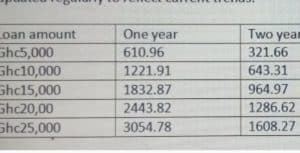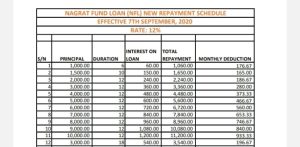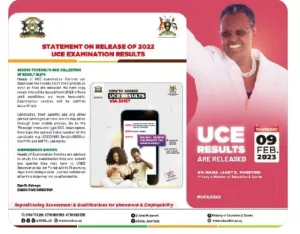New Policy on annual salary increment in Ghana

salary increment in Ghana
New Policy on annual salary increment in Ghana
Employers and employees consider annual salary increment in Ghana as a big deal. The employers in Ghana usually increase the salaries of their employees. Employers increase their salaries annually mostly.
There are different types of salary increment in Ghana. Some of the salary increments apply to some of the staff within the year. All staff enjoy the same percentage of salary increment in Ghana during an increment in certain categories
The private sector employers increase their salaries to accommodate the annual increase in the minimum wage.
The public sector employees are mostly concerned with an increase in the base pay for public sector workers. Whenever the government increases the base pay for public sector workers, the percentage increment is applied to the salaries of all workers.
See also: Determinant for 2024 salary increment announced
Types of salary increments in Ghana
There are various types of salary increment in Ghana. These are
1. Annual minimum wage increase
2. Annual base pay increase
3. Promotions
4. Incremental jump
1. Annual minimum wage increase
The minimum wage is the lowest amount of money that an employer must pay to the worker for a job done. The amount is set by law or by negotiation among relevant stakeholders. The most important relevant stakeholders who participate in negotiating this annual salary increment in Ghana is the tripartite committee. The committee is made up of three major stakeholders. The three stakeholders who form the committee are the government, the employer’s association, and the trade union congress, representing employees.
The committee meets annually to set the minimum amount of wage or salary any worker must earn for any job done. The amount set as the minimum wage is binding on all employers. Any employer who does not pay minimum wage disobeys the law and could be prosecuted.
The monthly minimum wage is the daily minimum wage multiplied by the 27 days.
Minimum wage increment in Ghana mostly affect private sector employees. This is because the minimum salaries of public sector workers are already significantly higher than the minimum wage.
2. Annual base pay increase
Base pay is also called base salary or basic salary. Base pay is an agreed amount that an employer agrees to pay an employee for his or her time and services before the employee starts working.
However, the employee loses the value of the agreed base pay over time through inflation. Employees and employers must meet annually to determine how much to increase salary for the year to off-set the loss in value of the base pay.
The government’s team and employees have always engaged in fierce negotiation to determine annual salary increments concerning the base pay.
The basic salary increment in Ghana, as announced by the Government, affects public sector workers only. This is because workers in private companies negotiate their respective salary increment in Ghana. The labor union at the private company leads the employees to negotiate their salary increment with their employers
3. Promotions
Employers have created room for the promotion of their workers. Some employees are promoted sometimes to acknowledge the extra output of employees. The employers also promote the employees sometimes to occupy vacant positions at the higher ranked levels.
All employees do not enjoy salary increment in Ghana due to promotions. Employees can only enjoy promotion-related salary increment in Ghana if they applied and pass through the promotion process
4. Incremental jump
Employees enjoy automatic salary increments every year. The employer grants the automatic salary increment in Ghana to reward long service. In other words, the employee enjoys seniority through the automatic salary increment.
The automatic salary increment in Ghana is represented by an increase in salary scale points. The salary scale points are popularly called ‘steps’ on the payroll.
Every employee’s step must change or increase every year. Therefore, any employee who spends three years on a particular level of salary scale will be on step 3.
New policy on incremental jump
The government introduced a new salary structure for public sector employees. The purpose of the new salary structure was to rationalize or streamline salaries in the public sector.
The new salary structure, Single Spine Salary Structure (SSSS), has an inbuilt mechanism that determines the salary increment in Ghana between two consecutive ‘steps’ on the new salary structure. The government also introduced a new policy on effective dates for incremental jumps. The government introduced the new effective dates after the implementation of the SSSS.
1. 1.7% difference between points
The Single Spine Salary Structure (SSSS) has a fixed rate between two consecutive points. The fixed-rate between two consecutive points is called the ‘relativity ratio’.
The relativity ratio is 1.7%. This means that an employee enjoys a 1.7% higher salary than a colleague with one point/ step lower on the salary scale. For instance, an employee on a salary scale of Level 16.3 will enjoy a 1.7% salary higher than a colleague on a salary scale of Level 16.2.
The relativity ratio of 1.7% is calculated on the basic salary. But the relativity ratio can be calculated on the gross salary since any increase in basic salary affects retention premium.
2. Effective dates for incremental jumps
Employees enjoy incremental jumps every year. This results in an annual salary increment in Ghana. However, every employee enjoys the effective date differently.
The last month any activity is effected against the employee on the payroll is the effective date or month for incremental jumps.
For instance, an employee’s first month of receiving salary will be the effective date for an annual incremental jump until another activity was entered against the employee on the payroll.
Also, the month in which an employee gets promoted or an employee gets his/her salary transferred will become the new effective date for the employee to enjoy the automatic salary increment in Ghana.
Previous policy
Previously, all employees enjoy an incremental jump in steps during September. Therefore, newly recruited employees also enjoy their first incremental jump in less than one year.
Post Disclaimer
The information contained in this post is for general information purposes only. The information is provided by Educative News and while we endeavour to keep the information up to date and correct, we make no representations or warranties of any kind, express or implied, about the completeness, accuracy, reliability, suitability or availability with respect to the website or the information, products, services, or related graphics contained on the post for any purpose.








